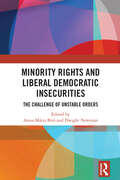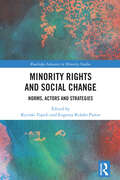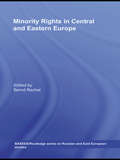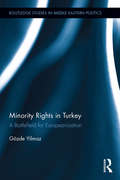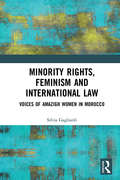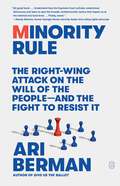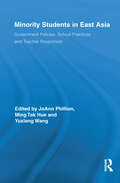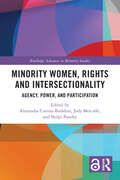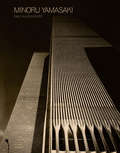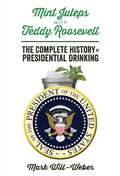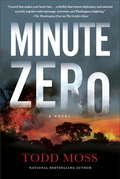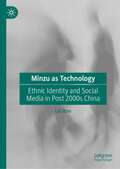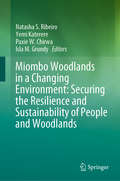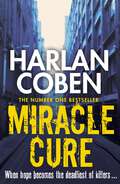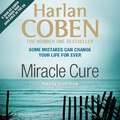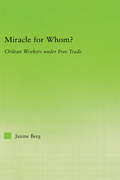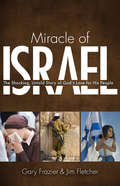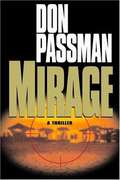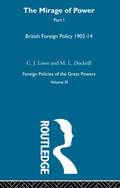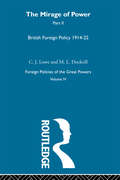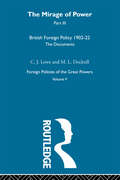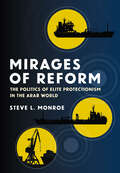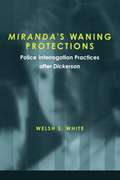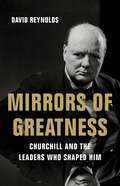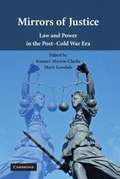- Table View
- List View
Minority Rights and Liberal Democratic Insecurities: The Challenge of Unstable Orders
by Dwight Newman Anna-Mária Bíró Sean WallerThis book addresses the impact of a range of destabilising issues on minority rights in Europe and North America. This collection stems from the fact that liberal democracy did not bring about the ‘end of history’ but rather that the transatlantic region of Europe and North America has encountered a new era of instability, particularly since the global financial crisis. The transatlantic region may have appeared to be entering a period of stability, but terrorist attacks on the soil of Euro-Atlantic states, the financial crisis itself, and other changes including mass migration, the rise of populism, changes in fundamental political conceptions, technological change, and most recently the Covid pandemic, have brought increasing uncertainties and instabilities in existing orders. In these contexts, the book investigates the resulting difficulties and opportunities for minority rights. Bringing together scholars from a range of disciplines, and engaged in work on various unstable orders, the book provides a unique, and largely neglected, perspective on present developments as well as addressing the pressing issue of the future of the minority rights regime at global, regional, and national levels. This book will appeal to those with interests in minority rights, human rights, nationalism, law, and politics.
Minority Rights and Social Change: Norms, Actors and Strategies (Routledge Advances in Minority Studies)
by Kyriaki Topidi Eugenia Relaño PastorMinority movements tirelessly continue to engage in the process of social change, trying to promote and enforce minority protection norms and to have their world views, cultural practices, and norms recognized by the state. Through an examination of selected cases, this book problematizes how collective identities are not structurally guaranteed but rather constructed in dialectically interrelated positions and identity layers. The authors show the kind of impact that these processes can, or fail to, have on minority norms, actors, and strategies.Going beyond abstract normative principles, this collection reflects both Global North as well as Global South perspectives and examines through a variety of angles the role that race and ethnicity, culture, or religion play within social mobilization towards social change. The volume offers global insight on actor and strategy attempts to foster social change through the instrumental use and interpretation of minority rights as norms. This book will be of interest to those researching minority rights broadly understood within the disciplines of law, anthropology, sociology, and political science.
Minority Rights in Central and Eastern Europe (BASEES/Routledge Series on Russian and East European Studies #Vol. 54)
by Bernd RechelMinority rights is an important issue in all modern states, but for those countries hoping to join the European Union the protection of minorities is a key condition for success in the accession process. This book provides a comprehensive assessment of minority rights in Central and Eastern Europe, covering all the countries of the region that have joined the EU since 2004, including Poland, Czech Republic, Hungary, Slovenia, Estonia, Lithuania, Latvia, Slovakia, Romania and Bulgaria. For each country it outlines the major developments since 1989, highlights the salient issues in minority rights politics, assesses the actual implementation of policies and legislation, explores the roles that domestic and international factors have played - including the impact of the EU succession process - and discusses whether there have been any major changes once EU accession was secured. Overall, this book is important for all those interested in European integration and minority rights politics, as well as for specialists on Central and Eastern Europe.
Minority Rights in Turkey: A Battlefield for Europeanization (Routledge Studies in Middle Eastern Politics)
by Gözde YilmazThe issue of minority rights is highly contested in both member and candidate states of the European Union. Compared with other policy areas, the Europeanization process in minority rights is much slower and more problematic. Turkey, though, differs from the majority of the member states by showing positive development, although admittedly it is still characterised by both accelerations and slowdowns. This book examines how minority protection, as a highly sensitive and controversial issue, is promoted or constrained in the EU’s neighbourhood, by focusing on the case of Turkey. It draws on current external Europeanization theories and suggests a rationalist model comprising both the role of the EU and also domestic factors. It integrates two models of external Europeanization provided by Schimmelfennig and Sedelmier (2005), i.e. the external incentives and lesson-drawing models, and the framework of the pull-and-push model of member state Europeanization by Börzel (2000), to derive a comprehensive model for external Europeanization. The book argues that the push by EU conditionality and the pull by domestic dissatisfaction are influential in promoting change. Without one or the other, domestic change remains incomplete, as it is either shallow or selective. Focusing on the Turkish case, the book enhances the theoretical understanding of external Europeanization by shifting focus away from EU conditionality to voluntarily driven change, and by providing a theoretical model that is applicable to other countries. It will therefore be a valuable resource for students and scholars studying minority rights and Turkish and European ethnic politics.
Minority Rights, Feminism and International Law: Voices of Amazigh Women in Morocco
by Silvia GagliardiInvestigating minority and indigenous women’s rights in Muslim-majority states, this book critically examines the human rights regime within international law.Based on extensive and diverse ethnographic research on Amazigh women in Morocco, the book unpacks and challenges generally accepted notions of rights and equality. Significantly, and controversially, the book challenges the supposedly ‘emancipatory’ power vested in the human rights project; arguing that rights-based discourses are sites of contestation for different groups that use them to assert their agency in society. More specifically, it shows how the very conditions that make minority and indigenous women instrumental to the preservation of their culture may condemn them to a position of subalternity. In response, and engaging the notion and meaning of Islamic feminism, the book proposes that feminism should be interpreted and contextualised locally in order to be effective and inclusive, and so in order for the human rights project to fully realise its potential to empower the marginalised and make space for their voices to be heard.Providing a detailed, empirically based, analysis of rights in action, this book will be of relevance to scholars, students and practitioners in human rights policy and practice, in international law, minorities’ and indigenous peoples’ rights, gender studies, and Middle Eastern and North African Studies.
Minority Rule: The Right-Wing Attack on the Will of the People—and the Fight to Resist It
by Ari Berman“Voting rights journalist Ari Berman has been detailing threats to our democracy for years, and his new book Minority Rule is a timely and essential read. He expertly shows how Republicans are trying to rig our political system—and shares how we can fight back.” —Hillary Clinton on XA riveting account of the decades-long effort by reactionary white conservatives to undermine democracy and entrench their power—and the movement to stop them.The mob that stormed the Capitol on January 6, 2021, represented an extreme form of the central danger facing American democracy today: a blatant disregard for the will of the majority. But this crisis didn’t begin or end with Donald Trump’s attempt to overturn the 2020 election. Through voter suppression, election subversion, gerrymandering, dark money, the takeover of the courts, and the whitewashing of history, reactionary white conservatives have strategically entrenched power in the face of a massive demographic and political shift. Ari Berman charts these efforts with sweeping historical research and incisive on-the-ground reporting, chronicling how a wide range of antidemocratic tactics interact with profound structural inequalities in institutions like the Electoral College, the Senate, and the Supreme Court to threaten the survival of representative government in America.“The will of the people,” wrote Thomas Jefferson in 1801, “is the only legitimate foundation of any government.” But that foundation is crumbling. Some counter-majoritarian measures were deliberately built into the Constitution, which was designed in part to benefit a small propertied upper class, but they have metastasized to a degree that the Founding Fathers could never have anticipated, undermining the very notion of “a government of the people, by the people, and for the people.” Chilling and revelatory, Minority Rule exposes the long history of the conflict between white supremacy and multiracial democracy that has reached a fever pitch today—while also telling the inspiring story of resistance to these regressive efforts.
Minority Students in East Asia: Government Policies, School Practices and Teacher Responses (Routledge Series on Schools and Schooling in Asia)
by JoAnn Phillion Yuxiang Wang Ming Tak HueIn Minority Students in East Asia: Government Policies, School Practices and Teacher Responses authors discuss their research on minority students’ schooling (elementary to higher education) in Mainland China, Hong Kong, Japan, South Korea, and Taiwan. Minority students’ educational issues are often neglected in literature and in practice; social and educational conditions that have resulted from globalization – in particular issues pertaining to minority groups’ education, language and other human rights – receive little attention. In addition, many areas of East Asia have viewed themselves as single-ethnicity countries and have not articulated strong agendas around minority rights. The purpose of this book is to highlight key educational issues for specific minority populations in East Asia. Themes addressed include government policies related to minorities; equity issues in the education of minorities; school practices and teacher perspectives on minorities; identity construction in terms of language and culture; national versus ethnic identity; teacher education issues; and parental concerns. The authors also discuss new theoretical orientations to understanding minority educational issues. A particular strength of this book is the use of multicultural education theories to both articulate concerns related to the education of minority students and to provide solutions to these concerns.
Minority Women, Rights and Intersectionality: Agency, Power, and Participation (Routledge Advances in Minority Studies)
by Alexandra Cosima Budabin, Jody Metcalfe, and Shilpi PandeyThis collection focuses on minority women through the perspectives of minority rights and intersectionality to investigate key concepts such as discrimination, inequality, agency, participation, resistance, and solidarity while also unpacking dynamics of power. It presents diverse grounded empirical cases drawing on field research and data collection while offering a global perspective that explores intersectionality and its effects on minority women ascribed alternately by nationality, religion, ethno-culture, gender, migration background, and race in seven countries as well as in digital and international political spaces. The authors include legal scholars, political scientists, sociologists, and anthropologists who study inequality, minority rights, race and gender issues, and the digital sphere. This interdisciplinary concatenation of authors offers an advantage when working at the junction between intersectionality and minority rights. Interdisciplinary in approach, the book will be of interest to researchers, academics, and policy-makers working in the areas of Human Rights Law, Minority Rights, Gender Studies, Political Science, Social and Cultural Anthropology, and Sociology.
Minoru Yamasaki: Humanist Architecture for a Modernist World
by Dale Allen GyureThe first book to reevaluate the evocative and polarizing work of one of midcentury America’s most significant architects Born to Japanese immigrant parents in Seattle, Minoru Yamasaki (1912–1986) became one of the towering figures of midcentury architecture, even appearing on the cover of Time magazine in 1963. His self-proclaimed humanist designs merged the modern materials and functional considerations of postwar American architecture with traditional elements such as arches and colonnades. Yamasaki’s celebrated and iconic projects of the 1950s and ’60s, including the Lambert–St. Louis Airport and the U.S. Science Pavilion in Seattle, garnered popular acclaim. Despite this initial success, Yamasaki’s reputation began to decline in the 1970s with the mixed critical reception of the World Trade Center in New York, one of the most publicized projects in the world at the time, and the spectacular failure of St. Louis’s Pruitt-Igoe Apartments, which came to symbolize the flaws of midcentury urban renewal policy. And as architecture moved in a more critical direction influenced by postmodern theory, Yamasaki seemed increasingly old-fashioned. In the first book to examine Yamasaki’s life and career, Dale Allen Gyure draws on a wealth of previously unpublished archival material, and nearly 200 images, to contextualize his work against the framework of midcentury modernism and explore his initial successes, his personal struggles—including with racism—and the tension his work ultimately found in the divide between popular and critical taste.
Mint Juleps with Teddy Roosevelt: The Complete History of Presidential Drinking
by Mark Will-WeberIn the more than two-hundred-year history of the American presidency, there has been one element present in each and every administration: alcohol.In the beginning, there was George Washington, who sold whiskey distilled at Mount Vernon and preferred to quaff a well-crafted port. More than two hundred years later, Barack Obama beckoned some master brewers to advise his White House staff on how to make mouth-watering batches of White House Honey Ale with a key ingredient from Michelle Obama's beehives.And then there was the matter of the forty-two other gentlemen in between...Journalist Mark Will-Weber strolls through our country's memorable moments--from the Founding Fathers to the days of Prohibition, from impeachment hearings to diplomatic negotiations--and the role that a good stiff drink played in them in his new book, Mint Juleps with Teddy Roosevelt: The Complete History of Presidential Drinking.So grab a cocktail and turn the pages of Mint Juleps with Teddy Roosevelt for a unique and entertaining look into the liquor cabinets and the beer refrigerators of the White House. Cheers!
Minute Zero
by Todd MossAn extraordinary international thriller by the former deputy assistant secretary of state and author of the national bestseller The Golden Hour. In the life of every country, at a moment of extreme national disruption, there is a brief period of breakdown, when everything is uncertain, events can turn on a dime. That is the moment to act, to shape events how you want them to go. That is Minute Zero.Fresh off the harrowing events of The Golden Hour, State Department crisis manager Judd Ryker is suddenly thrown into a quickly developing emergency in Zimbabwe, where a longtime strongman is being challenged for the presidency. Rumors are flying furiously: armed gangs, military crackdowns, shady outside money pouring in, and, most disturbing for the United States, reports of highly enriched uranium leaking into the market.And that's all before Ryker even lands in the country. It gets much worse after that. If he can't get control, shape his Minute Zero, a lot of people are going to die--not least of all himself.
Minzu as Technology: Ethnic Identity and Social Media in Post 2000s China
by Lei HaoThis book provides a unique ethnographic approach to the understanding of ethnogenesis in the Chinese context, with a particular focus on how it is being reshaped in the post-2000s era. It reinterprets the Chinese concept of ethnicity, or minzu, by investigating its evolution in relation to the proliferation of media technologies. In an era characterized by digital connectivity, the quest for ethnic identity has taken on new dimensions. Ethnic groups, like the Sibe community from Xinjiang, are now extending beyond the state’s traditional interpretations of minzu. Leveraging the power of media technology, they are articulating and expressing their ethnic identities in new and personalised ways. These developments have led to the emergence of what this book terms ‘networked ethnicity,’ a fresh manifestation of ethnic identity formation in the era of social media. The pivotal question this book attempts to answer is: How does an ethnic group in China today understand its identity, and what role does technology and media play in that process? This exploration offers a critical perspective on the complex interplay between digital technology, individual agency, and ethnic identity formation. This study will be of interest to scholars of cultural studies, Chinese society, ethnic studies, and media studies, or anyone keen to understand the changing landscape of ethnic identity in the digital age.
Miombo Woodlands in a Changing Environment: Securing the Resilience and Sustainability of People and Woodlands
by Yemi Katerere Natasha S. Ribeiro Paxie W. Chirwa Isla M. GrundyBased on work by the Miombo Network in southern Africa, this book helps decision-makers and general readers alike improve their understanding of the socio-ecology of the Miombo woodlands across southern Africa. It also highlights the importance of and the need for further research on the unique Miombo ecology and its link with economic development. One major challenge facing these woodlands is the influence that direct (both natural and anthropogenic) and indirect drivers of change, as well as interactions between these, have had over the centuries. As such the book explores the socio-economic and ecological interactions that occur in these woodlands and discusses the need for further research to provide a better understanding of these interactions.Drawing on data and information from numerous studies conducted in the last 20 years, the book presents a comparative analysis of policy changes and management experiences in the countries concerned. It also addresses issues of global climate change, since they have an impact on Miombo ecosystem management and restoration, and provides future projections based on an assessment of how climate change has affected the Miombo woodlands in the past.
Miracle Cure: A gripping thriller from the #1 bestselling creator of hit Netflix show Fool Me Once
by Harlan CobenThey were looking for a miracle cure, but they instead they found a killer . . .Sara and Michael. The ideal celebrity couple, darlings of the media - until their lives are shattered by a mystery illness.Dr Harvey Riker. His clinic has found the miracle cure that millions seek. One-by-one his patients are getting well. One-by-one they are targeted by a serial killer more fatal than the disease.Lieutenant Bernstein. His true desires make him a perfect choice to track the killer - or a perfect victim.Can anyone stop the killer who will do anything to prevent the world's most desperately needed miracle cure . . . ?
Miracle Cure: They were looking for a miracle cure, but instead they found a killer...
by Harlan CobenSara and Michael. The ideal celebrity couple, darlings of the media - until their lives are shattered by a mystery illness.Dr Harvey Riker. His clinic has found the miracle cure that millions seek. One-by-one his patients are getting well. One-by-one they are targeted by a serial killer more fatal than the disease.Lieutenant Bernstein. His true desires make him a perfect choice to track the killer - or a perfect victim.Can anyone stop the killer who will do anything to prevent the world's most desperately needed miracle cure . . . ?Read by Scott Brick(p) 2011 Brilliance Audio
Miracle for Whom?: Chilean Workers Under Free Trade (New Political Economy Ser.)
by Janine BergMiracle for Whom? offers a fresh and insightful perspective to the debate on rising income inequality in Chile, and on the broader question of how free trade affects the demand for workers in developing countries.
Miracle of Israel: The Shocking, Untold Story of God's Love For His People
by Jim Fletcher Gary FrazierEveryone is looking for a miracle. Families devastated by a faltering economy. A college student facing the horrific diagnosis of cancer. Corporately, whole nations are teetering on the brink of despair and chaos. The Miracle of Israel is a stunning examination of the millennia-old love that God has for His people that: Clearly conveys the promise God gave to Abraham Examines the ancient prophecies regarding Israel that have happened and are unfolding even today Provides an easy-to-read timeline of miracle after miracle related to the nation of Israel Tracing the history of the Jewish people to the present day, the authors look at prophecy after prophecy that clearly attest to the Lord's miraculous promises. From historical records to personal, dramatic stories, the Miracle of Israel shows us that in keeping epic promises to the nation of Israel, God's provision for each of us is sure, perfect, and on time, every time.
Mirage
by Don PassmanA mental whiz who runs a cyber-encryption company, John Berger is at the top of his game and sure that all his hard work will soon pay off. After playing in a two-day chess tournament, he arrives at work to find his office building bombed and several people killed. When questioned by the police, he explains he was playing chess at the time of the explosion. Then comes a greater shock ("the police tell him the chess tournament never took place.
Mirage Of Power Pt1 V3
by Lowe & DockrillPublished in 2001, Mirage Of Power Pt1 V3 is a valuable contribution to the field of History.
Mirage Of Power Pt2 V4 (Foreign Policies Of The Great Powers Ser. #Vol. 4)
by Lowe and DockrilFirst Published in 2001. Routledge is an imprint of Taylor & Francis, an informa company.
Mirage Of Power Pt3 V5 (Foreign Policies Of The Great Powers Ser. #Vol. 4)
by Lowe and DockrillFirst Published in 2001. Routledge is an imprint of Taylor & Francis, an informa company.
Mirages of Reform: The Politics of Elite Protectionism in the Arab World
by Steve L. MonroeIn Mirages of Reform, Steve L. Monroe argues that geopolitics and social connections between state and capital underpin the Arab world's uneven trade policies. Despite decades of international pressure, neoliberal trade policy reform in the Arab world has been varied, selective, and often ineffective. Neoliberal trade policies have not deepened international trade in many of the region's markets. This book explains why.When the region's regimes have strong support from global powers and strong social connections to the industrial elite, they engage in extensive but deceptive trade policy reform. Behind an edifice of neoliberal trade policies, neopatrimonial forms of protectionism like tax evasion and noncompetitive procurement shield the socially connected from international competition and obstruct actual trade liberalization. Industrialists are less trustful of regime promises of neopatrimonial protectionism after reform when they have weak social connections to their regime and their regime has low support from global powers. They are more likely to defend existing protectionist policies under these conditions, resulting in less trade policy reform. Drawing on interviews, firm- and industry-level data, and evidence from Jordan to Morocco, Mirages of Reform reveals how international and domestic factors interact to shape the Arab world's rugged trade policy terrain. Insightful and well researched, this book imparts important lessons and warnings about the repercussions of economic reform in the region.
Miranda's Waning Protections: Police Interrogation Practices after Dickenson
by Welsh S. WhiteDid the Supreme Court's upholding of Miranda in 2000 adversely impact law enforcement, as conservatives have complained, or was it a reaffirmation of individual rights? Welsh S. White looks at both sides of the issue, emphasizing that Miranda represents just one stage in the Court's ongoing struggle to accommodate a fundamental conflict between law enforcement and civil liberties, and assessing whether the Court's present decisions (including Miranda) strike an appropriate balance between promoting law enforcement's interest in obtaining reliable evidence and the individual's interest in being protected from overreaching police practices.
Mirrors of Greatness: Churchill and the Leaders Who Shaped Him
by David ReynoldsA new biography of Winston Churchill, revealing how his relationships with the other great figures of his age shaped his own triumphs and failures as a leader Winston Churchill remains one of the most revered figures of the twentieth century, his name a byword for courageous leadership. But the Churchill we know today is a mixture of history and myth, authored by the man himself. In Mirrors of Greatness, prizewinning historian David Reynolds reevaluates Churchill&’s life by viewing it through the eyes of his allies and adversaries, even his own family, revealing Churchill&’s lifelong struggle to overcome his political failures and his evolving grasp of what &“greatness&” truly entailed. Through his dealings with Adolf Hitler and Neville Chamberlain, we follow Churchill&’s triumphant campaign against Nazi Germany. But we also see a Churchill whose misjudgments of allies and rivals like Roosevelt, Stalin, Gandhi, and Clement Attlee blinded him to the British Empire&’s waning dominance on the world stage and to the rising popularity of a postimperial, socialist vision of Great Britain at home. Magisterial and incisive, Mirrors of Greatness affords Churchill his due as a figure of world-historical importance and deepens our understanding of his legend by uncovering the ways his greatest contemporaries helped make him the man he was, for good and for ill.
Mirrors of Justice: Law and Power in the Post-Cold War Era
by Kamari Maxine Clarke Mark GoodaleMirrors of Justice is a groundbreaking study of the meanings of and possibilities for justice in the contemporary world. The book brings together a group of both prominent and emerging scholars to reconsider the relationships between justice, international law, culture, power, and history through case studies of a wide range of justice processes. The book's eighteen authors examine the ambiguities of justice in Europe, Africa, Latin America, Asia, the Middle East, and Melanesia through critical empirical and historical chapters. The introduction makes an important contribution to our understanding of the multiplicity of justice in the twenty-first century by providing an interdisciplinary theoretical framework that synthesizes the book's chapters with leading-edge literatures on human rights, legal pluralism, and international law.
